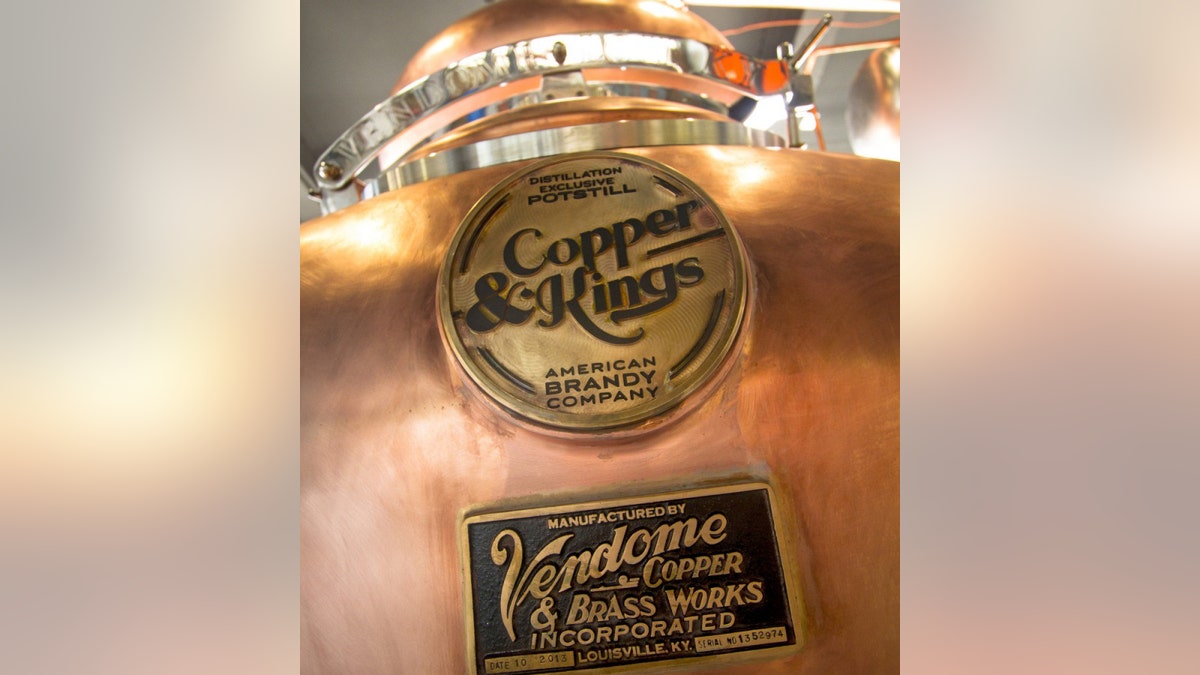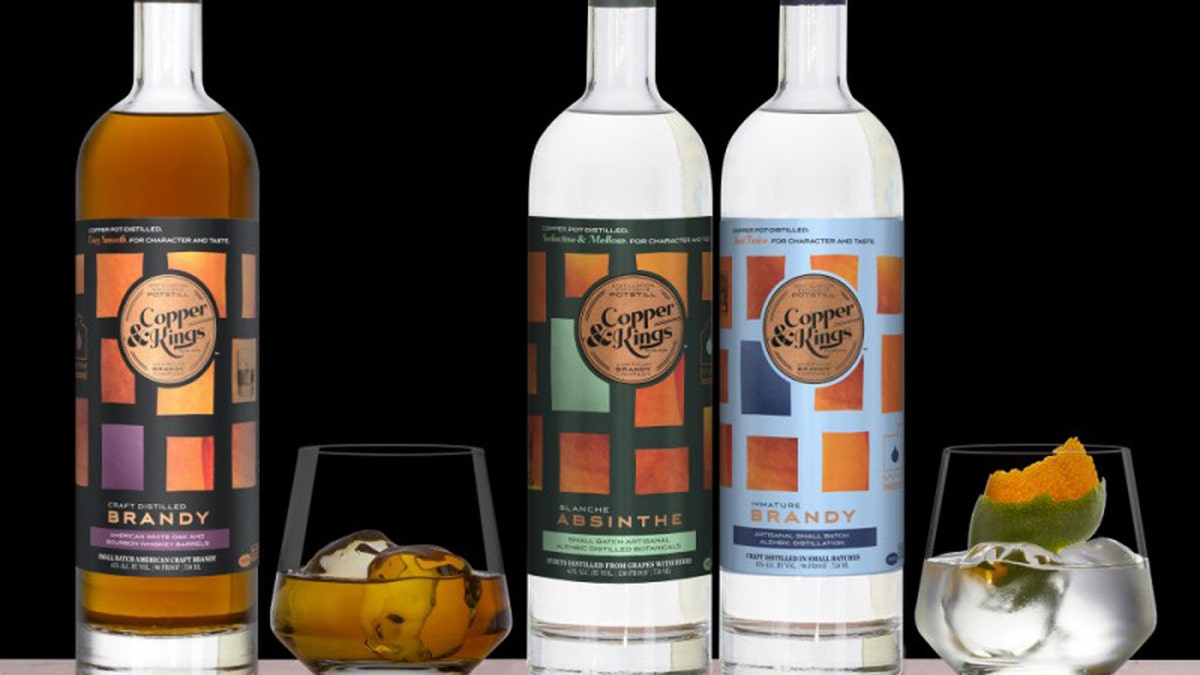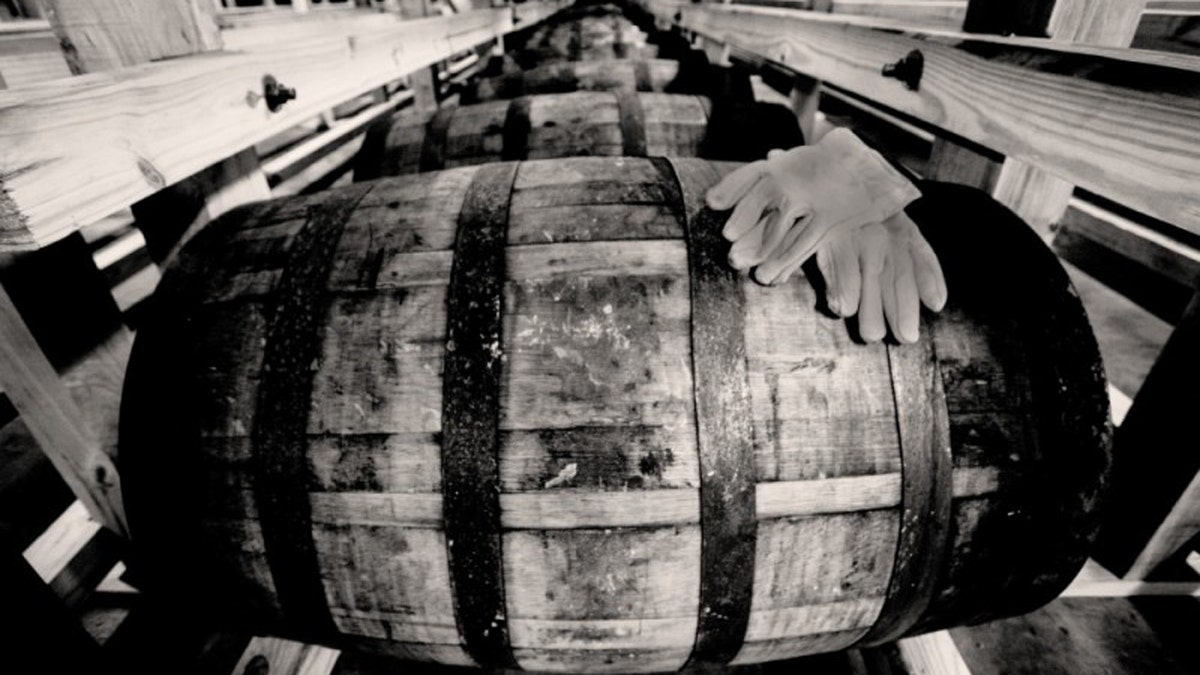
Handcrafted pot stills by Louisville’s legendary Vendome Copper & Brass Works are part of the all-American vibe at Copper & Kings. (Copper & Kings)
Kentucky craft brandy is hot, but you can ditch your snifters: This stuff drinks like a whiskey and has a distinctly American swagger.
The quest for an all-American style led Joe and Lesley Heron to launch their brandy distillery, Copper & Kings, not on the West Coast, where most American grapes (the raw material for most brandies) are grown, but in the bourbon hub of Louisville.
“Nobody had defined themselves as an American brandy.”
“We really wanted to be in the heart of American distilling,” Joe Heron says. “Our reference points are much more American whiskey and American music. We wanted to infuse brandy with the character and personality of American whiskey.”
Americans drank more than 11 million cases of brandy and cognac (a high-end French brandy) last year, according to the Distilled Spirits Council. But most of it was at either end of the price range: inexpensive, mass-produced brandies from California wine giants or expensive cognacs from France.
Heron saw a niche for an American-made craft brandy.
“It’s a trade-up vehicle for domestic brandy drinkers and also a trade-in vehicle for a cognac drinker looking for a different style,” he said. Copper & Kings is also going for whiskey drinkers who want to shake things up a little. “Brandy’s strength is that you have the heft and power you want from brown spirits, but you get finesse and length.”

(Copper & Kings)
Joe and Lesley Heron are natives of South Africa whose careers in the pharmaceutical industry brought them to Minneapolis in the early 2000s. After developing a nutrient-enhanced soda and a popular hard cider, both of which were sold to large beverage conglomerates, the couple turned their attention to Americans’ growing interest in craft brewing and distilling and decided the market was right for a high quality American brandy.
“We’re immigrants, and the romance of America still burns quite brightly inside us,” Heron said. “Nobody had defined themselves as an American brandy.”
They moved to Louisville in the fall of 2013 and opened their distillery last year, barrel-aging and blending carefully sourced brandy from other craft producers while their own small batch ages in barrels.
The distillery made headlines last year for its “sonic aging” protocol, playing music for the barrels 24/7 in hopes that the sound waves will enhance the aging process. Beyond the music, Heron said, a focus on quality meant rejecting some standard price-cutting practices (like adding sugar, flavoring and coloring) and opting out of the cold filtration process that some distillers use to remove residue. Skipping the chill may leave a little cloudiness, but it preserves flavor and mouth feel, Heron said.
The Herons invested in top-of-the-line equipment (three handmade copper pot stills named after women in Bob Dylan songs) and talent. Head distiller Brandon O’Daniel, who hails from a longtime Kentucky distilling family, has training in viticulture, and assistant distiller Alan Bishop is known for his exceptional palate. These experienced tasters are crucial during the labor-intensive double distillation process.

Aging brandy in bourbon barrels and new American oak is part of what creates the Copper & Kings DNA, says owner Joe Heron. (Copper & Kings)
The distillery sources most of its base wine from California’s Central Valley, where it’s made according to O’Daniel’s specifications with grapes selected for high acidity and aromatics. After that, it’s all Kentucky. It’s distilled there, it’s blended there and it ages in bourbon barrels and new American oak there, giving it what Heron calls the “Copper & Kings DNA.”
Bill Owens, president of the American Distilling Institute, said there now are 39 craft brandy distilleries in the U.S., mostly small and on the West Coast and making other products as well.
“The brandy guys have a long road to hoe,” Owens said. “It’s definitely an interesting category. The flavors are fabulous.”
The Herons agree. Copper & Kings is now distributed in 20 states, with a product range that includes grape-based American brandy; a reserve brandy named for the Butchertown neighborhood where the distillery is located; an apple brandy; an immature brandy (a white spirit increasingly popular in cocktails); and a brandy-based absinthe.
“What they’re doing already is really awesome, and they don't have much competition,” said mixologist Jourdán Gomez of Minneapolis’ Constantine cocktail bar. “They make a really good product, and I think they’re on the right path for sure.”
Heron likes his on the rocks, but Gomez said there’s a big place for it in cocktail culture. Bartenders are using American craft brandy in classic cocktails like the Corpse Reviver (a riff on the bourbon-based Manhattan), made with traditional brandy, apple brandy and sweet vermouth, and the Jack Rose, made with apple brandy and grenadine. “It’s a fall cocktail to a tee,” Gomez said.
And while Copper & Kings, on a certain level, is following in Kentucky bourbon’s footsteps, historically it's the other way around, said bourbon expert Michael Veach, author of “Kentucky Bourbon Whiskey: An American Heritage.”
Veach and his research partner, Renae Price, say brandy was the inspiration for aged bourbon. They say two French brothers in the early 1800s decided to age bourbon whiskey (distilled from corn) in charred oak barrels to make it more appealing to customers in brandy-loving New Orleans.
“Brandy is the original craft distilling in America. The first brandy was made eight years before the first rye whiskey and well before bourbon,” Veach said.
So things may now be coming full circle for this American classic.
“[Brandy] was as much a part of our heritage as bourbon,” Price said. “It has been overlooked. It’s an underappreciated spirit. People aren’t educated about it, and Joe’s at the forefront of getting that education started.”
